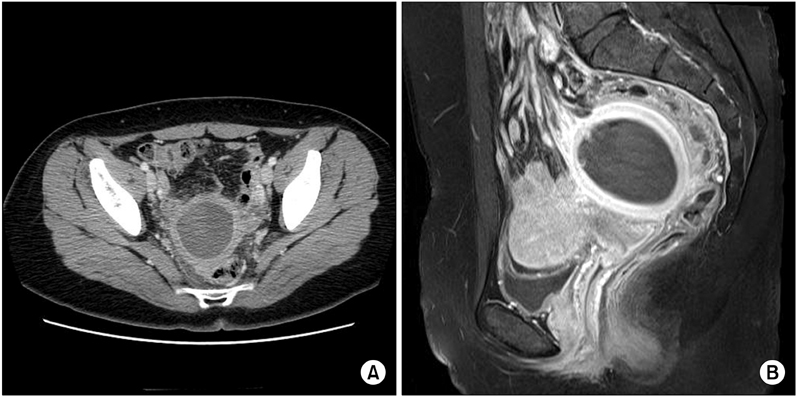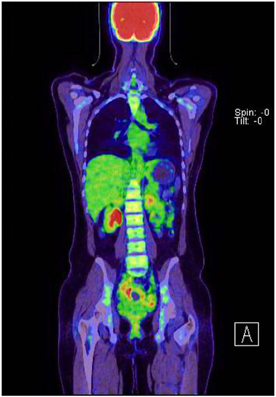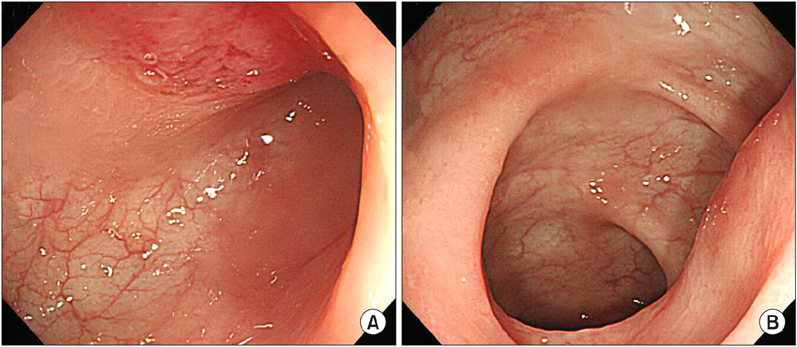J Korean Surg Soc.
2013 Jun;84(6):367-370. 10.4174/jkss.2013.84.6.367.
Adenocarcinoma arising from Meckel's diverticulum in the ileum with malrotation of the midgut
- Affiliations
-
- 1Department of Surgery, Seoul St. Mary's Hospital, The Catholic University of Korea College of Medicine, Seoul, Korea. wonkkang@catholic.ac.kr
- 2Department of Surgery, Gyeongsang National University Hospital, Gyeongsang National University School of Medicine, Jinju, Korea.
- KMID: 1505187
- DOI: http://doi.org/10.4174/jkss.2013.84.6.367
Abstract
- Meckel's diverticulum (MD) is a true congenital diverticulum that is remnant by incomplete obliteration of the omphalomesenteric duct. It is the most common congenital anomaly of the gastrointestinal tract, with an estimated prevalence of 2% (0.3% to 3% in autopsy studies). About 90% of MD occurs within 100 cm of the ileocecal valve. A primary malignant tumor arising within an MD is extremely uncommon. Malignancies are reported to account for only 0.5% to 3.2% of the complications. Carcinoids are the most common malignant tumors occurring in MD. Adenocarcinomas are extremely uncommon and very poor prognosis has been reported. We report a case of radiographically diagnosed chronic inflammatory mass caused by adenocarcinoma arising from MD in the ileum with malrotation of the midgut incidentally discovered at exploration.
MeSH Terms
Figure
Reference
-
1. Dumper J, Mackenzie S, Mitchell P, Sutherland F, Quan ML, Mew D. Complications of Meckel's diverticula in adults. Can J Surg. 2006. 49:353–357.2. Stone PA, Hofeldt MJ, Campbell JE, Vedula G, DeLuca JA, Flaherty SK. Meckel diverticulum: ten-year experience in adults. South Med J. 2004. 97:1038–1041.3. Jay GD 3rd, Margulis RR, McGraw AB, Northrip RR. Meckel's diverticulum; a survey of one hundred and three cases. Arch Surg. 1950. 61:158–169.4. Yahchouchy EK, Marano AF, Etienne JC, Fingerhut AL. Meckel's diverticulum. J Am Coll Surg. 2001. 192:658–662.5. Mackey WC, Dineen P. A fifty year experience with Meckel's diverticulum. Surg Gynecol Obstet. 1983. 156:56–64.6. Ymaguchi M, Takeuchi S, Awazu S. Meckel's diverticulum. Investigation of 600 patients in Japanese literature. Am J Surg. 1978. 136:247–249.7. Turgeon DK, Barnett JL. Meckel's diverticulum. Am J Gastroenterol. 1990. 85:777–781.8. Dixon AY, McAnaw M, McGregor DH, Keushkerian S, Miller LK, Pierce PD. Dual carcinoid tumors of Meckel's diverticulum presenting as metastasis in an inguinal hernia sac: case report with literature review. Am J Gastroenterol. 1988. 83:1283–1288.9. Kusumoto H, Yoshida M, Takahashi I, Anai H, Maehara Y, Sugimachi K. Complications and diagnosis of Meckel's diverticulum in 776 patients. Am J Surg. 1992. 164:382–383.10. Ford PV, Bartold SP, Fink-Bennet DM, Jolles PR, Lull RJ, Maurer AH, et al. Procedure guideline for gastrointestinal bleeding and Meckel's diverticulum scintigraphy. Society of Nuclear Medicine. J Nucl Med. 1999. 40:1226–1232.
- Full Text Links
- Actions
-
Cited
- CITED
-
- Close
- Share
- Similar articles
-
- Incidence of Meckel's Diverticulum
- Perforation of Meckel's Diverticulum by a Chicken Bone; Preoperatively Presenting as Bowel Perforation
- A Case of a Meckel's Diverticular Bleeding Diagnosed by the Use of Double Balloon Enteroscopy
- Laparoscopic Management for Intestinal Obstruction Caused by Meckel's Diverticulum
- Perforation of a Meckel’s Diverticulum Following Ingestion of a Chicken Bone: A Case Report and Literature Review





